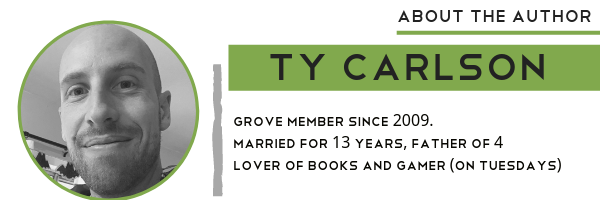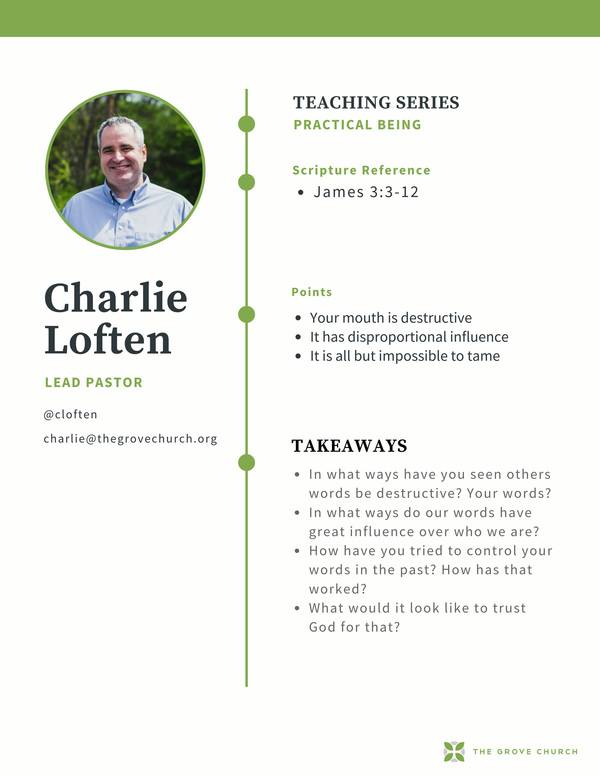
by Ty Carlson
When someone brings up any verse – heck, even some modern idiom – about “the tongue” my immediate thought usually goes to the Mouth of Sauron. Not sure if you’re familiar but let me enlighten you. This guy speaks for the worst baddie in The Lord of the Rings books because let’s face it, if you were the most evil dude in the world, you’d make other people do your bidding, too. He goes out to meet the good guys (Aragorn, Gandalf, etc) and starts talking about all the horror Sauron will inflict and how the good guys are so weak, yada yada yada. Well Aragorn (in the movie, mind) just straight up decapitates him (spoiler alert?). In the books there’s a nobler path that is taken because the Mouth is actually just a coward, and he cowers even though no one raises a hand to hurt him. The reason that these sayings about the tongue bring this character to mind is because the tongue is a tool, much like the Mouth, to be used as its wielder sees fit. That would be the stance of most of us, but if we serve a higher purpose, much like Aragorn in the books, how do we know where to look?
In James 3, the author speaks a great deal about the tongue. Now I know that the chapter and verse separations were executed a good while after the letter was written, but he makes some interesting comparisons throughout the chapter. He takes one stance at the start of this portion of his letter and ends up taking the opposite stance, stringing the reader through a confusing array of descriptions . The first lists what the tongue is. In short, the tongue is a weapon of mass destruction just waiting to be loosed on the world. James calls it “small” but also “a restless evil full of deadly poison.” When you read it, you’re reaction might just be “Now you wait a minute, bub.” But lets finish the chapter with the point that he’s trying to conclude with. The latter half of the chapter speaks about wisdom. Interesting that the evils of the tongue would be couched within the same chapter as wisdom, especially since one is tangible and the other an idea. Regardless, he goes through another list, this one almost perfectly mirroring each evil aspect mentioned earlier with one of a more heavenly nature. James describes wisdom as “pure” and “considerate” and “full of good fruit.” If you’ve noticed a pattern, pat yourself on the back, you deserve it for sticking with me this far.
That pattern, you’ll find, is that nearly all of the evil aspects of the tongue have an alternate that is good. Where the tongue is “a world of pure evil” wisdom is “pure,” where the tongue is “restless evil” wisdom is “submissive,” and my favorite, the tongue is “full of poison” and wisdom “full of mercy.” James sets up polar opposite pairs, one at the start and one at the end. There are as many as six good/evil matches, with more depending on how deep you’d like to dive.
>
“Being a peacemaker requires talking. Talking with the tongue. All of the characteristics of wisdom have just been laid out, and they counteract the evils of the tongue. Doesn’t it make sense that in order to be wise, your words have to spread peace? Our jobs are not to tame the tongue, James says it plainly in verse 8, “no human being can tame the tongue.” Our jobs are to pursue heavenly wisdom.”
I know what you’re thinking, “that’s great, Ty, I really always wanted to study the subtle nuances of Biblical literature.” I know you did, but pay attention, this is the important part: Where do we go from here? We see how James writes about how bad the tongue is and how good wisdom is, what’s the connection? James 3:18 says “Peacemakers who sow in peace reap a harvest of righteousness.” Being a peacemaker requires talking. Talking with the tongue. All of the characteristics of wisdom have just been laid out, and they counteract the evils of the tongue. Doesn’t it make sense that in order to be wise, your words have to spread peace? Our jobs are not to tame the tongue, James says it plainly in verse 8, “no human being can tame the tongue.” Our jobs are to pursue heavenly wisdom. The distinction here is that there is earthly wisdom (unspiritual and demonic 3:15) and heavenly (pure and peace-loving 3:17). For one to be wise, you have to avoid distraction. Wisdom isn’t the same as knowledge. One popular description is that knowledge is knowing a tomato is a fruit, but wisdom is knowing it doesn’t belong in a fruit salad.
From here, the choice is yours. Do you allow something that the Bible describes as being “set on fire by Hell” to do as it wishes or pursue something “full of good fruit”? The choice appears to be easy, but the tongue is tricky. My parents always warned me that by allowing an inch, the tongue would take a mile. Saying “golly” would lead to “oh my gosh” which would lead to “oh my God” and taking the Lord’s name in vain. I agree with the sentiment, at the very least. Pausing the pursuit of wisdom for a moment allows the tongue freedom that, should it be left alone, could wreak unparalleled havoc. Be “wise and understanding…show it by their good life, by deeds done in the humility that comes from wisdom,” James 3:13.

